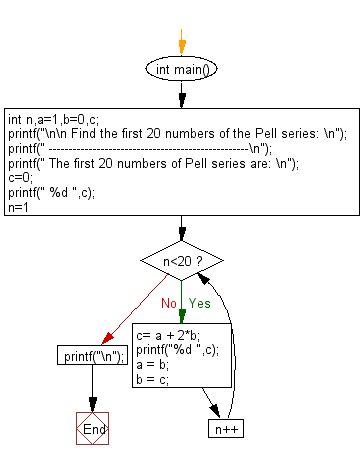C Exercises: Print the first 20 numbers of the Pell series
C Numbers: Exercise-35 with Solution
Write a program in C to print the first 20 numbers of the Pell series.
Sample Solution:
C Code:
# include <stdio.h>
# include <stdlib.h>
int main()
{
int n,a=1,b=0,c;
printf("\n\n Find the first 20 numbers of the Pell series: \n");
printf(" --------------------------------------------------\n");
printf(" The first 20 numbers of Pell series are: \n");
c=0;
printf(" %d ",c);
for(n=1; n<20; n++)
{
c= a + 2*b;
printf("%d ",c);
a = b;
b = c;
}
printf("\n");
}
Sample Output:
The first 20 numbers of Pell series are: 0 1 2 5 12 29 70 169 408 985 2378 5741 13860 33461 80782 195025 470832 1136689 2744210 6625109
Pictorial Presentation:
Flowchart:

C Programming Code Editor:
Contribute your code and comments through Disqus.
Previous: Write a program in C to find narcissistic decimal numbers within a specific range.
Next: Write a program in C to check if a number is Keith or not.
What is the difficulty level of this exercise?
Test your Programming skills with w3resource's quiz.
C Programming: Tips of the Day
Static variable inside of a function in C
The scope of variable is where the variable name can be seen. Here, x is visible only inside function foo().
The lifetime of a variable is the period over which it exists. If x were defined without the keyword static, the lifetime would be from the entry into foo() to the return from foo(); so it would be re-initialized to 5 on every call.
The keyword static acts to extend the lifetime of a variable to the lifetime of the programme; e.g. initialization occurs once and once only and then the variable retains its value - whatever it has come to be - over all future calls to foo().
Ref : https://bit.ly/3fOq7XP
- New Content published on w3resource:
- HTML-CSS Practical: Exercises, Practice, Solution
- Java Regular Expression: Exercises, Practice, Solution
- Scala Programming Exercises, Practice, Solution
- Python Itertools exercises
- Python Numpy exercises
- Python GeoPy Package exercises
- Python Pandas exercises
- Python nltk exercises
- Python BeautifulSoup exercises
- Form Template
- Composer - PHP Package Manager
- PHPUnit - PHP Testing
- Laravel - PHP Framework
- Angular - JavaScript Framework
- Vue - JavaScript Framework
- Jest - JavaScript Testing Framework
